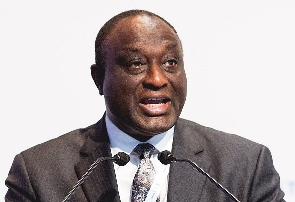Leader of the Movement for Change and Independent Presidential Candidate, Alan Kyerematen, has stated that the notion that Parliament is a master of its own rules holds no basis in law.
According to him, Parliament, contrary to the belief behind that assertion, is bound by the decisions of the Supreme Court, and another attempt at refusing to comply with an order of the court will amount to a breach of the 1992 Constitution, specifically Article 113 (1).
“The claim by Parliament that it is a ‘Master of Its own Rules’ has no merit in law and seeks to undermine the very spirit underpinning the concept of checks and balances between the various arms of Government,” Mr. Kyerematen emphasized.
“Even if Parliament is of the view that the decision of the Supreme Court is wrong, it must comply with the orders of the Court and adopt a judicial path to the resolution of the matter,” he said at a press conference in Accra on Thursday, October 31.
Speaking on the recent debacle between the Supreme Court and the Speaker of Parliament over the former’s declaration of four seats as vacant, Mr. Kyerematen described the development as “unwarranted, unjustifiable, unproductive, and unhealthy for our fledgling democracy.”
According to the flagbearer, who is also a trained lawyer, the Supreme Court’s decision to suspend the Speaker’s declaration of the four seats is unconstitutional and represents an overreach, as the Court exercised its powers of interpretation of the law capriciously in the matter, which he noted as sensitive to national stability.
“Article 97 (1) (g) and (h) of the Constitution cannot be said to lack clarity. The said provisions are very clear in both spirit and letter, and unconditionally impose a duty on the Speaker of Parliament to declare vacant the seat of any sitting Member of Parliament who changes their status in Parliament by either joining another party or becoming independent,” he stated.
“It is obvious from the mandatory language of the provision that no issue arises of interpretation, requiring the Supreme Court to exercise its discretion. The Supreme Court’s mandate to interpret provisions of the Constitution is not to be exercised capriciously, particularly in very sensitive contexts with implications for subverting the rule of law and obstructing the principle of Separation of Powers,” he added.
GA/KA
Watch the latest episode of Ballot Briefing below:



